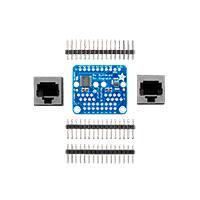Adafruit NeoPXL8 Friend - 8 x Strands
NeoPixel Level Shifter
PRODUCT ID: 3975
Since we first started carrying NeoPixels back in 2012, the chainable RGB LEDs
have taken over the world. And a big part of that success is due to the simplicity
of their wiring - just one data wire, no matter how many pixels you've got. So no
surprise they're everywhere, blinking away in art exhibits, maker faire demos, DJ
booths, decorations and costumes.
But, at some point, every NeoPixel'er bumps into the constraints of that singledata-wire: the timing is very picky and often time your code has to stop
completely so that it can burst out the data without any interruptions. This
requirement makes it tough to create fast-update lighting effects, and limits the
number of pixels you can drive before other hardware peripherals get attention.
�
Resident pixel-pro Paint Your Dragon (who coined the name NeoPixel dont-chaknow!) took on this challenge and has succeeded gloriously. By carefully
examining the ATSAMD21 and ATSAMD51 datasheet he noticed you could use
the Timer 0 in 'waveform' mode, and create 8 unique waveforms over DMA that
would handle all the pixel-pushing for you.
Thus is born the NeoPXL8 Arduino library and NeoPXL8 Friend! The library runs
on any of our ATSAMD21 (M0) and ATSAMD51 (M4) board and handles all the
NeoPixeling for you, up to 8 strands of concurrent DMA output each one can be
250 pixels long for a total of 8 x 250 = 2000 pixels. That leaves you some RAM
for your code to run in as well - the theoretical max is 340 pixels per strand but
you'd be using all the RAM on the M0 chip.
To make connection easy, this Friend does the level-shifting and logic
bootingfor you. All 8 strands have a level shifter that converts the 3.3V logic
level to 5V logic, there's even a little switch-cap converter that generates the
clean 5V power supply for you. Then a 100 ohm resistor in line after the buffer
reduces ringing on long wiring runs.
The breadboard friendly design plugs into your perf board or breadboard, wire
up the 8 data lines, ground line and a 3-5V power supply for the level shifter
boost (10mA max draw). Out comes beautiful 5V logic for any NeoPixel
compatibles.
You get two options for connecting NeoPixels:
2 x 8 Header with ground and 5V-logic signal, in pairs
2 x RJ-45 'Ethernet' Jacks, with ground and 5V-logic signal per twisted
pair. This matches the same wiring as the OctWS2811
The Friend comes as a kit, so you can solder in the headers or jacks however
you like. You can even just solder both edges to plug into a breadboard on both
sides. Then, of course, you'll also need to provide lots of 5V power to the
NeoPixels. Since you'll need many Amps of current, we don't manage that
through the Friend - the PCB copper would be too limiting. We recommend
using terminal blocks or bus bars to connect all the ground/5V power wires
together and powering them from their own chunky 5V supply.
�
Since we are using TCC0 (Timer 0), we are limited in what pins can be used for
NeoPixel output. We recommend using with Arduino Zero or Metro M0 Express,
with pins 0-7, that's what our library works best with. On M4 you can use pins
2-7, 10 and 11. You can also use with ItsyBitsy M0 or M4. Check the library
example for other pin configurations you can use. If you're using a Feather M0
or M4, we recommend our NeoPXL8 FeatherWing which is more compact and
Feather-shaped.
While we designed this specifically for use with our SAMD21 and SAMD51
boards and library, you could use it with other boards like ESP32, Teensy or
STM32, for the level shifting capabilities. You'll just have to figure out what
NeoPixel driver firmware you can use and what pins are available.
If that all sounds groovy to you, pick up one of these friends and check out the
NeoPXL8 Arduino library examples to get your massive LED project going!
Product Dimensions: 32.3mm x 28.5mm x 2.5mm / 1.3" x 1.1" x 0.1"
Product Weight: 3.0g / 0.1oz
https://www.adafruit.com/product/3975 10‐15‐18
�
很抱歉,暂时无法提供与“3975”相匹配的价格&库存,您可以联系我们找货
免费人工找货- 国内价格 香港价格
- 1+56.910691+7.13610
